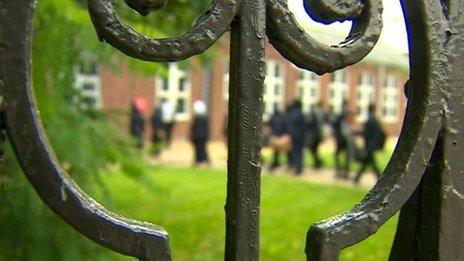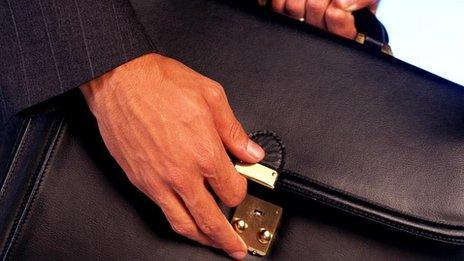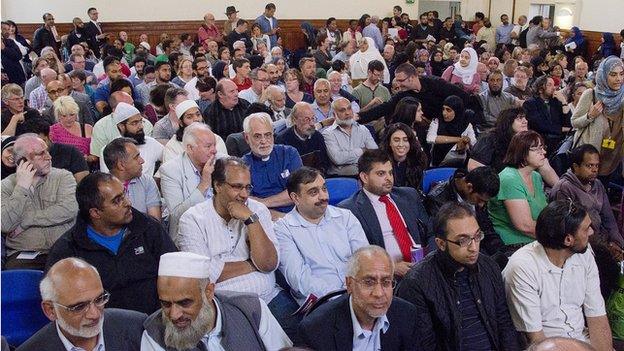Wilshaw warns MPs of Trojan school extremism risk
- Published
Sir Michael Wilshaw: "Governors are there to set the strategy ... not to run the school themselves"
Inspectors found pupils at the so-called Trojan Horse schools in Birmingham were "vulnerable to extremism", says Ofsted chief Sir Michael Wilshaw.
Sir Michael was giving evidence to MPs on the education select committee.
He said inspectors had found governors had over-stepped their role and heads were "intimidated and undermined".
Ofsted had inspected schools in Birmingham in the wake of claims of take-overs by Muslim hardliners.
Sir Michael said inspectors were "looking at other schools where this might be a problem. We've certainly been to schools in Bradford and Luton".
Last month, Ofsted published the findings of inspections in 21 schools in Birmingham and issued a statement claiming that head teachers had been "marginalised or forced out of their jobs".
The claims had been strongly rejected by some of the schools - and on Wednesday, the education select committee sought details of why inspectors had reached such damning conclusions.
The Ofsted chief was pressed by MPs for evidence of extremism and why he believed that there had been organised attempts to infiltrate governing bodies.
'Orchestrated'
Sir Michael said head teachers had told Ofsted they believed there was an "orchestrated" plan and a deliberate "strategy".
"People had got together and decided which schools to target," said Sir Michael, describing what head teachers had told inspectors.
He said that as an ex-head teacher he had been "distressed" by the bullying of staff by governors.
There were staff who were so frightened that evidence had to be given to inspectors in a supermarket car park, he told MPs.
Sir Michael highlighted concerns about how governors were trying to take on a managerial role in schools.
"What we did see was governors going into the school and deciding they would move head teachers out of the school... to promote their own ideas," he said.
School leaders were "frightened" by the threat of governing bodies being taken over, but had little trust in the council's ability to intervene, Sir Michael told the committee.
MPs asked whether inspectors had found specific examples of extremism in the affected schools.
Sir Michael said there was a culture which "made children vulnerable to extremism". He said that schools were too inward looking and did not show sufficient tolerance to other faiths.
Governing governors
The Ofsted chief warned that the role of governors needed to be re-examined.
There was a "big debate to be had" about oversight in an increasingly autonomous system, said Sir Michael.
"We need more professional governance. Full stop," said Sir Michael. He said governors should be paid - "as much as a school budget could afford" - to move beyond the current "amateurish" approach to overseeing schools.
Sir Michael told MPs that all schools, including academies, should be part of a wider cluster - and that inspections in future might focus on groups of schools rather than focusing on individual institutions.
MPs also challenged Ofsted about the reliability of inspections, when some of the Trojan Horse schools put into special measures had previously been judged as outstanding.
Committee chairman Graham Stuart highlighted how a trip to Saudi Arabia had been praised by inspectors on one visit and then criticised in the next.
The chief inspector rejected suggestions that the sudden changes in grades showed a flawed inspection system - arguing that schools could go into sudden decline.
He also explained how previous inspections did not raise concerns about school take-overs or extremism.
"It's possible to miss these issues. Particularly if head teachers are frightened, if school leaders are frightened, if teachers are frightened to speak out because of fear for their jobs, fear they won't be promoted."
Sir Michael said he had spoken to parents in Birmingham and had been "hugely impressed" by them.
"We need to get this sorted as soon as possible," he said.
- Published9 June 2014

- Published10 June 2014

- Published27 June 2014
